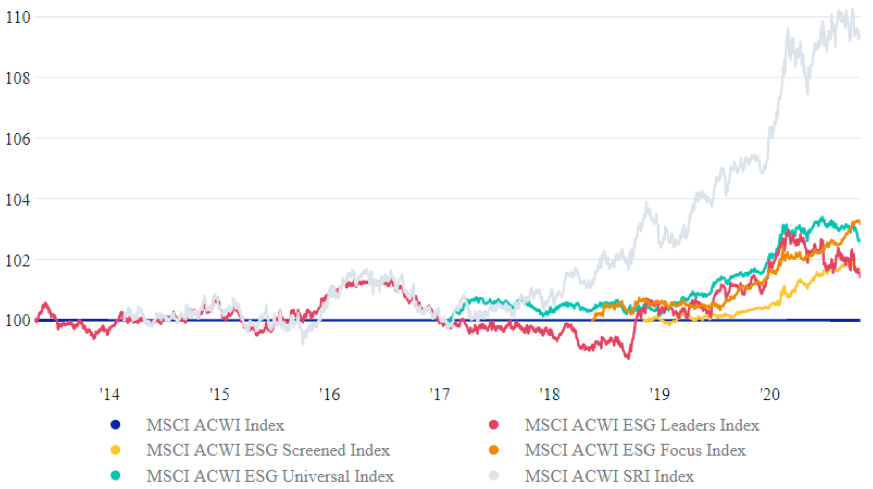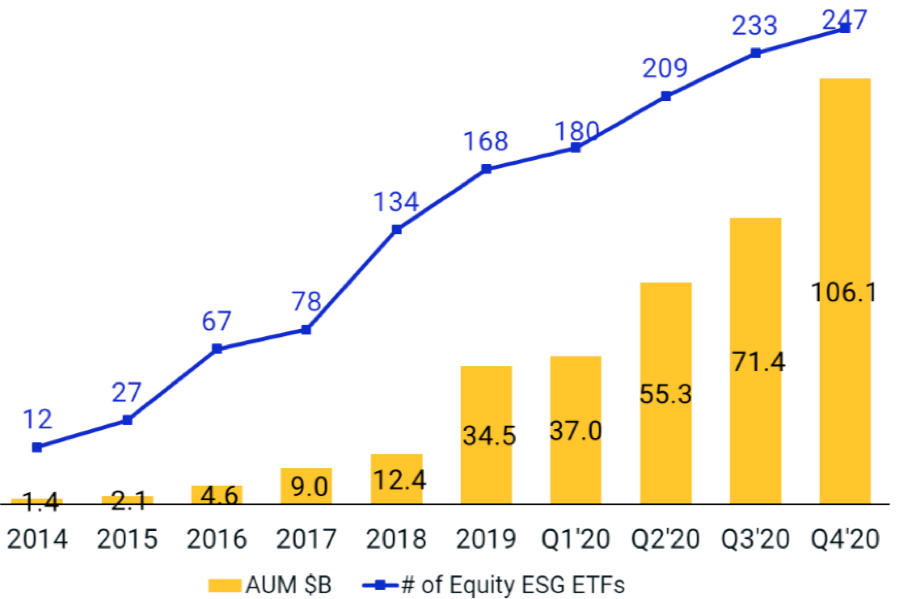Sustainable investing gets COVID boost
The story Super’s green push lures MSCI recently ran in The Australian Financial Review. It is evident from the article:
- ESG is going to be a focus for Australia’s largest superannuation funds;
- MSCI is a market leader creating ESG indices for passive investments to track; and
- In 2020 MSCI’s ESG indices outperformed the broader Australian equities market.
This is not a phenomenon unique to Australia. Globally, sustainable investing accelerated during the COVID-19 pandemic, with more investors taking environmental, social and/or governance (ESG) factors into account and investors often reaping an extra return for that consideration.
The COVID-19 pandemic has focused investors’ attention on the vulnerability and resilience of communities and intensified discussions around sustainability. Social factors have taken on greater importance as the health and safety of communities worldwide has become a significant consideration for investors. Other events, such as the horrific death of George Floyd and the aftermath had investors considering the ‘social’ factor. Bushfires and climate change added to the importance of considering environmental factors in investment decision-making in 2020.
These considerations – climate change, the Black Lives Matter movement and the COVID-19 pandemic – have concentrated investors’ minds on ESG factors and more companies are being challenged for substandard behaviour and poor management of ESG factors.
This is evidenced by Google Trends, the search term “ESG” has never been as popular as it is today. Compared to early March 2020, the number of searches for ESG had doubled by January 10-16, 2021. This highlights that people are increasingly seeking information on the topic.
Performance lift from ESG
Added to a greater awareness of ESG is that we now know that doing good has helped some companies to perform better financially during this crisis. Last year, MSCI, one of the world’s largest index providers released a research paper, Five Lessons for Investors from the COVID-19 Crisis, which we discussed here.
The experience through the COVID-19 pandemic highlights that ESG investing is more than just an ethical consideration. Taking into account ESG factors helped to lift shareholder returns during the COVID-19 pandemic, MSCI found. This outperformance during the pandemic has added to the long-term track record of these indexes, as can be seen in the exhibit below, which displays the longest available history for major MSCI ESG global equity indexes compared to MSCI All Country World Index (ACWI).
Figure 1 Performance of MSCI ACWI ESG Indices since inception vs MSCI ACWI

Source: MSCI blog: Is ESG Investing a Price Bubble? Probably not. 9 December 2020. Data from May 31, 2013, to Nov. 30, 2020. MSCI ESG Universal Index represents an ESG weight-tilt approach; MSCI ESG Leaders is a 50% best-in-class sector approach; MSCI SRI is a 25% best-in-class sector approach; and MSCI ESG Focus is an optimized approach designed to maximize ESG exposure. The data shows live-track performance for each index: MSCI ACWI ESG Leaders has been live since June 6, 2013; MSCI ACWI SRI since March 24, 2014; MSCI ACWI ESG Universal since Feb. 8, 2017; MSCI ACWI ESG Focus since June 25, 2018; and MSCI ESG Screened since Dec. 14, 2018.
Previous research from MSCI had shown that companies with high MSCI ESG ratings showed lower levels of systematic risk, lower cost of capital and higher valuation levels — measured by price-to-book and price-to-earnings (P/E) ratios — compared to companies with low MSCI ESG ratings in the MSCI World Index from January 2007 through May 2017. This valuation premium is also noticeable in MSCI ESG indices, as shown in the table below.
Figure 2 Valuation Measures of MSCI ESG indices Compared to MSCI ACWI
This supports several other research pieces which have found a link between ESG investing and performance. Dr Philipp Krueger, an Assistant Professor of Responsible Finance at the University of Geneva, has studied the relation between ESG characteristics and investment performance. Krueger said in a 2018 paper, The Sustainability Footprint of Institutional Investors:
High sustainability footprint investors also display higher risk-adjusted performance … We further document that this enhanced risk-adjusted performance of high sustainability footprint portfolios is primarily driven by a strong reduction in total portfolio risk, suggesting risk mitigation as being one of the main channels through which portfolio-level sustainability generates long-term value.
ESG fund inflows rise sharply
Inflows into ESG funds have soared in recent years and months, in part motivated by outperformance since the COVID-19 pandemic erupted. Over the past four years, inflows into ESG funds have surged. For instance, the growth in ETFs tracking MSCI ESG indices has risen sharply, measured in terms of the number of ETFs and assets under management (see the chart below). The acceleration of inflows and strong performance has driven up prices for high-ESG-rated companies and thus pushed up returns for ESG investments.
Figure 3: ETFs Based on MSCI ESG Indices

Source MSCI, December 2020
ESG analysis takes a lot of work
Careful analysis is required of a company’s policies, procedures and practices before investors can fully assess its ESG worthiness. Considerations as varied as labour standards, workplace diversity including gender and ethnic diversity, the efficiency of resource use, risk controls, management competency, environmental impacts and whether a company produces controversial products such as weapons or adult entertainment, are just some factors which need to be considered as a part of an ESG framework.
While such analysis has traditionally been the domain of active funds management, MSCI is now the leading global ESG researcher. With its large team of analysts and extensive research, its ESG ratings can help investors avoid the risk of an ESG failure overwhelming a company’s financial performance or reputation.
Many active fund managers maintain that they incorporate ESG factors into their investment analysis. However, investors need to ask whether their ESG analysis is in-depth or superficial. If they don't have a big team crunching the numbers and examining all aspects of a company's management operations, corporate policies and governance, then their ESG analysis is likely to produce little insight.
The adoption of an index can help asset owners apply a consistent approach to integrating ESG at both the strategic asset allocation level as well as across all individual allocations. Superannuation funds and institutions have been gradually adopting greater ESG investment. MSCI found in its Integrating ESG into Benchmarks paper that switching to an ESG policy benchmark such as tracking an index may lead to a more consistent approach across an entire investment portfolio than adopting an ad hoc or arbitrary approach to ESG integration.
Swiss Re, one of the world’s largest reinsurers, in 2017 said it would shift its entire investment portfolio worth around US$130 billion to MSCI’s ESG indices family, choosing benchmarks that systematically integrate ESG criteria rather than more traditional benchmarks. Guido Fürer, Group Chief Investment Officer at Swiss Re, said MSCI benchmarks “represent a suitable tool to achieve the desired investment behaviour and set the right measurement both from a performance and ESG perspective.”
In Australia, institutional investors have been at the forefront of sustainable or responsible investing. It is estimated that around $1.9 billion in assets under management (AUM) is controlled by Australian investment managers known to be applying responsible investment to some or all of their investment practices. That amounts to 60% of the professionally managed AUM, according to the Responsible Investment Benchmark Report 2020 from the Responsible Investment Association Australasia.
Exchange traded funds (ETFs) can be used to readily meet the demand for ESG investments from retail investors, self-managed superannuation funds, and institutional investors including large super funds.
Not already a Livewire member?
Sign up today to get free access to investment ideas and strategies from Australia’s leading investors.
4 topics

